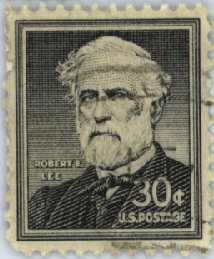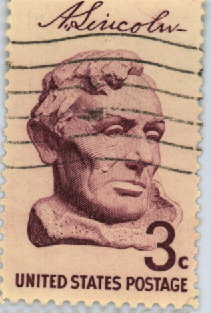The Tide Peaks And Ebbs
On January 1, 1863, President Lincoln issued an Emancipation Proclamation, freeing the slaves in the rebelling states and inviting them to join the armed forces of the north. The Proclamation thus declared the abolition of slavery an objective of the war in addition to the declared objective of saving the Union.
The north continued to do poorly in the east. The overland advance on Richmond was still thwarted, and in a bloody battle at Chancellorsville, Union forces suffered a severe defeat. This Confederate victory was gained at a high price, however, for it cost the life of Stonewall Jackson.
 None
of the Confederate victories was decisive. The federal
government simply mustered new armies and tried again. July
1863 brought the turning point of the war. Believing that the
crushing defeat of the north at Chancellorsville gave him his
chance, Lee struck northward into Pennsylvania,
almost reaching
the state capital. A strong Union force intercepted Lee's march
at
Gettysburg, where, in a three-day battle, the Confederates
made
a valiant effort to break the Union lines. They failed, and Lee's
veterans, after crippling losses, fell back to the Potomac.
None
of the Confederate victories was decisive. The federal
government simply mustered new armies and tried again. July
1863 brought the turning point of the war. Believing that the
crushing defeat of the north at Chancellorsville gave him his
chance, Lee struck northward into Pennsylvania,
almost reaching
the state capital. A strong Union force intercepted Lee's march
at
Gettysburg, where, in a three-day battle, the Confederates
made
a valiant effort to break the Union lines. They failed, and Lee's
veterans, after crippling losses, fell back to the Potomac.
Grant's army was then taking possession of Vicksburg on the Mississippi. The blockade of southern coasts had become an iron cordon that few vessels pierced and the Confederacy was nearing the end of its resources. The northern states, on the other hand, seemed more prosperous than ever; their mills and factories were running full blast; their farms were exporting bumper crops to Europe; their manpower was being restored by immigration.
Grant's slow but inexorable advance on Richmond in 1864 foreshadowed the end. From all sides northern troops closed in, and on February 1, 1865, General Sherman's western army began a march northward from Georgia.
 On February 17, the Confederates abandoned Columbia, the
South Carolina capital. Without a battle, Charleston fell into the
hands of the Union fleet when her railroad connections with the
interior were cut. Meanwhile the Confederate positions in
Petersburg and Richmond proved untenable, and on April 2 Lee
abandoned them. A week later, at Appomatox, Virginia
, hemmed in
by the enemy, he had no alternative but surrender.
On February 17, the Confederates abandoned Columbia, the
South Carolina capital. Without a battle, Charleston fell into the
hands of the Union fleet when her railroad connections with the
interior were cut. Meanwhile the Confederate positions in
Petersburg and Richmond proved untenable, and on April 2 Lee
abandoned them. A week later, at Appomatox, Virginia
, hemmed in
by the enemy, he had no alternative but surrender.
The terms of surrender were magnanimous, and on his return from the conferences, Grant quieted the noisy demonstrations of his soldiers by reminding them, "The rebels are our countrymen again." The war for southern independence had become the "lost cause," whose hero, Robert E. Lee, had won wide admiration through the brilliance of his leadership and his greatness in defeat.
For the north, the war produced a still greater hero in Abraham Lincoln - a man eager, above all else, to weld the Union together again, not by force and repression but by warmth and generosity. Although he had to use unprecedented powers both in war and in peace, he never infringed upon the principles of democratic self-government. In 1864 he was elected for a second term as President.
